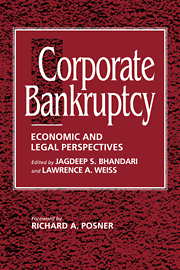Book contents
- Frontmatter
- Contents
- List of tables and figures
- Foreword by the HONORABLE RICHARD A. POSNER
- Preface
- Part I The role of credit
- Part II Bankruptcy as a reflection of the creditors' implicit bargain
- Part III Beyond the basic creditors' bargain
- Part IV Workouts or bargaining in the shadow of bankruptcy
- Part V Alternatives to bankruptcy and the creditors' bargain
- Part VI Experience of other countries
- Index
Foreword by the HONORABLE RICHARD A. POSNER
Published online by Cambridge University Press: 10 December 2009
- Frontmatter
- Contents
- List of tables and figures
- Foreword by the HONORABLE RICHARD A. POSNER
- Preface
- Part I The role of credit
- Part II Bankruptcy as a reflection of the creditors' implicit bargain
- Part III Beyond the basic creditors' bargain
- Part IV Workouts or bargaining in the shadow of bankruptcy
- Part V Alternatives to bankruptcy and the creditors' bargain
- Part VI Experience of other countries
- Index
Summary
Professors Bhandari and Weiss have put together a splendid anthology on the economics of corporate bankruptcy. A subject that lies at the intersections of price theory and game theory and of economic theory and finance theory – a subject moreover of great practical importance because of the large number of bankruptcies of major business firms in recent years – it has attracted some of the keenest minds in law, economics, and their interface have generated a literature of great power and variety well illustrated by the selections in this volume.
The literature has a twofold focus. The first is the puzzle of corporate debt. Without debt, and indeed without multiple creditors, a corporation would not face a substantial risk of bankruptcy (there would be some risk, because of the possibility of multiple involuntary creditors, such as asbestos tort claimants). Since bankruptcy is usually a personal disaster for the managers of the bankrupt firm, and since according to the Modigliani–Miller thesis the value of a firm is invariant to its capital structure, one is surprised that American corporations typically have so much debt and so many creditors. The answer is that the thesis abstracts from what may be important aspects of the economics of corporate structure, not only the obvious one – the more favorable tax treatment of debt than of equity – but also agency costs. Among other things, corporate debt may offset excessive risk aversion by managers that is due to the fact that their wealth is concentrated in firm-specific human capital.
- Type
- Chapter
- Information
- Corporate BankruptcyEconomic and Legal Perspectives, pp. xi - xivPublisher: Cambridge University PressPrint publication year: 1996
- 1
- Cited by

